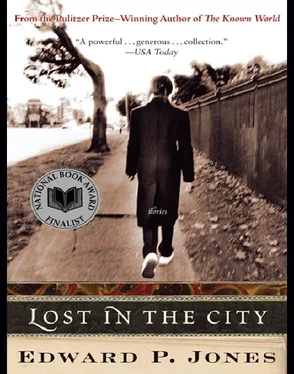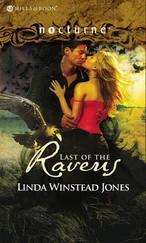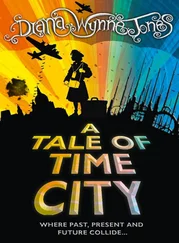Diane lived in a house half the size of Vivian’s on 9th Street Southeast, not far from Lincoln Park. Vivian let herself into the house with her own key. Diane lived with her second husband, Harry, and her youngest daughter from her first marriage, along with her daughter’s only child, an overweight boy of four who had been spoiled beyond redemption. Two of Diane’s sons were in Lorton for selling cocaine. “She ain’t had a happy life, I can tell you that,” Vivian would say in defending her friend to people who thought she had raised her children wrong. “Have a little sympathy.”
Diane, dressed and made up, was at the kitchen sink, drinking the last of her coffee. Everyone said good morning except for the little boy, who sat beside his mother at the table, playing with a truck that was as big as his head. Vivian sat down across from the boy, as far away from him as she could get. The boy would have thought nothing of touching her with his greasy hands. The odor of coffee and bacon had settled about the room, and Vivian counted off the weeks she had been on her diet.
“Vi, don’t get comfortable, cause I’m all ready,” Diane said.
“We got plenty of time,” Vivian said. “A minute or two won’t hurt.”
“Who yall got today?” Cherry, Diane’s daughter, asked. She was, like her mother, a very plain and charming woman who could immediately put the world at ease. She had waited until she was thirty-one to marry, but it was to a man she now fought with night and day. And usually after the worst fights, she ran away to stay with Diane, until her husband came and knocked contritely at his mother-in-law’s door. “And think of that poor ugly daughter of hers,” Vivian would say to people as she defended her friend.
“The House first, ain’t it, Vi?” Diane said, coming up behind her grandson. “The Hoouuse…” She dragged the word out as if the sound of it could frighten the boy, and then she tickled his sides. “The House gonna get you.” The boy, moving the truck along the edge of the table, ignored her.
“The House in the early afternoon,” Vivian said, “then Holy Tabernacle in the evening.”
Diane’s husband said, “That House got that Reverend Saunders, ain’t it? God’s gift to the world, ain’t he?”
“So he think,” Vivian said. In the world of Washington gospel, Vivian’s Gospelteers, a group of four women and a piano player, had a respectable reputation that she felt had outgrown a storefront like the House. But twenty-five years before, just after the group’s birth, Reverend Saunders was the first to say, “Come and sing before my people.” She felt she owed him. It was an obligation he could remind her of on the phone with no more than a “God bless you and a good evenin to you, Sister Slater.” Reverend Saunders, even with a flock that could fit into one Metrobus, was a proud man, and though Vivian always told him the church owed them nothing, he would have the Gospelteers wait at the end of the program while he and his wife went about the church collecting what the members could contribute to the group. At the large churches built to last until kingdom come, payment came in a check with the church’s name in bold, unflinching letters at the top center.
“Yall gonna sing, ‘I’m a Pilgrim’?” Diane’s husband said. “I do like that song. Reminds me of what they used to sing back home. I could listen to it all day long.”
Vivian said, “We’ll do it at the House, but not at Holy Tabernacle. Reminds you of bein back in your mama’s arms, huh?” She reached across to pinch his cheek. He was a large light-skinned man and he blushed.
She began to sing to him, and for the first and only time the boy raised his head and looked at her.
I have trouble on ev’ry hand
But I’ve started for the city…
I’m goin down to the river Jordan
I’m gonna bathe my weary soul.
“Oh, get outta here,” he said, and she sang on because she liked seeing that she had pleased. When she had finished, he asked, “You think your no-count piano player’ll show up this time?”
“He’d better,” Diane said.
“You got that right,” Vivian said. “Just thinkin about last Sunday sets my teeth on edge.”
Despite being a young man who spent most of his Sundays in churches hitting the ivory keys for God, the piano player, Counsel Smith, lived a fast life, much of it packed into Friday and Saturday nights. So it was often difficult for him to collect himself on Sunday morning, to pull himself away from a willing woman and clear his head of alcohol, and to go off to be with four other women, one of whom was old enough to be his grandmother, two of whom were old enough to be his mother, and one of whom had a ring through her nose about another man.
“We already told him if he miss one more time or be late one more time, he’s finished,” Diane said. She set her cup in the sink, then looked sternly at her daughter and pointed into the sink full of dirty dishes. “There ain’t nothin worse in the world than gettin up at some church and havin to make up excuses about why you didn’t bring your piano player.”
“Yall should be able to sing without a piano player by now,” her husband said.
“Ain’t that much singin in the world,” Vivian said. The adults laughed, and then the boy, as if afraid he was being left out, laughed as well.
“You ready?” Vivian said to Diane.
“As ready as I’ll ever be.” She gave her husband a passionate kiss on the lips, a kiss that Vivian thought was too much for a Sunday morning at the kitchen table. Diane then pinched the boy’s cheeks. “Ooh, ooh,” she said. “Ooh, my little butterball.” The boy wiggled away.
In the car, going to pick up the other two women, Diane inspected her face in a palm-sized mirror she took from her pocketbook. Vivian drove down to Massachusetts Avenue.
“How long Cherry gonna be with you this time?” Vivian said.
“Can’t tell,” Diane said. “Can’t ever tell. Just have to wait till they both come to their senses, and lately it’s takin em longer and longer. Soon they won’t have any sense at all. I’m just thankful for a understandin husband.”
Vivian watched her friend out of the corner of her eye. She noted that Diane was putting on more weight. The two women were both fifty-seven years old, though Vivian would have been quick to tell anyone that she was younger by seven months.
Diane sighed and grew quiet. She put the mirror back in her pocketbook and studied the road before them. Her singing voice was no longer what it had been once upon a time and she knew this, but she and Vivian went back a long way. Then, too, in most of the churches of Washington, the people who heard the Gospelteers were generally more concerned about the message than the messenger’s delivery.
Vivian laughed, shaking her friends’s arm. “Oh, come on now,” she said. “Snap out of it. Pull up them droopy lips.”
“Lord, yes,” Diane said. “It’s gonna be a wonderful day. And”—she drummed her fingers on the pocketbook—“there is a bright spot there out on the horizon.” She shook her head with delight.
“Oh,” Vivian said, “what is this bright spot?”
“Later, I’ll tell you later, when there’s time,” Diane said, and she shook herself some more.
The woman who was old enough to be Counsel Smith’s grandmother was Maude Townsend, a blind woman who lived at Claridge Towers on M Street Northwest, an apartment house for old people and the disabled. On the day the House of the Solitary Savior burned to the ground, Maude was waiting outside Claridge Towers with Anita Hughes, the newest and youngest member of the group.
Читать дальше












